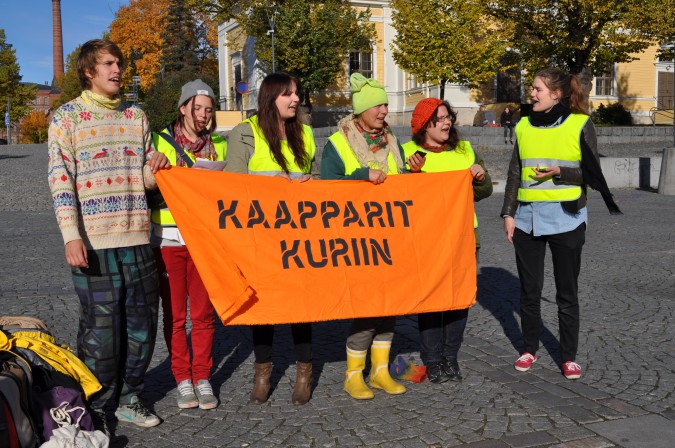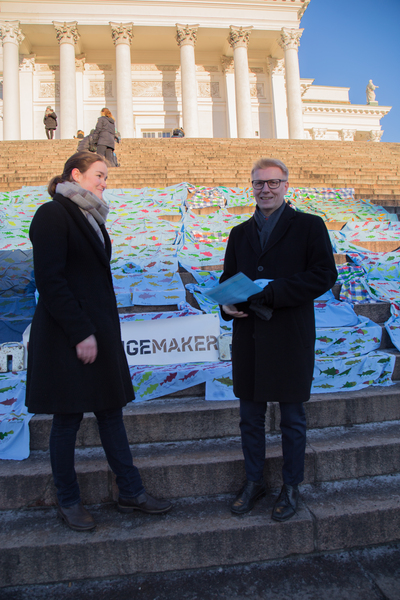Previous campaigns
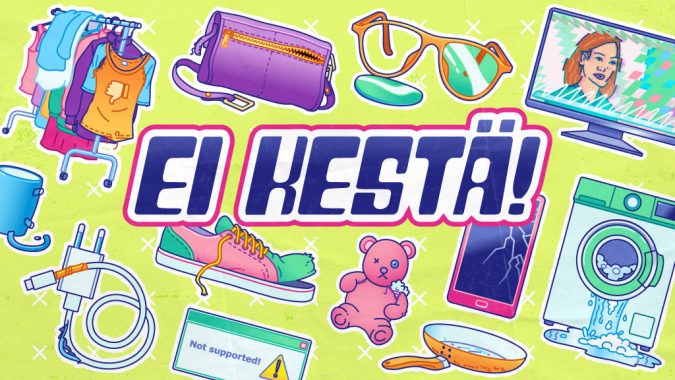
Ei kestä! Campaign against overconsumption
The world keeps consuming more and more. If everyone consumed like people in Finland do, we would need more than three planets worth of resources. It is estimated that the consumption of all the people of the world will rise to the same level as the Finns by 2050. This scenario must be stopped – and the Finns need to decrease their own consumption.
Overconsumption means that we consume over the planets natural limits. Over-consumption is created, among other things, by the fact that the goods produced are of poor quality. Goods and textiles are no longer made to last, but to maximize profits for companies and investors. The life cycle of modern products is very short. This can be seen, for example, in very poor quality but cheap clothes. In electronic products, the aim is to make a profit, for example, by making them difficult to repair or by discontinuing software upgrades for older models. Thus, the consumer is sometimes forced to adapt to the rapid pace of production. In addition, cultural factors, such as fashion and ever-changing trends, increase our desire to consume and replace functional and intact clothing and products with new ones.
Overconsumption exacerbates various problems related to the environment and global living conditions, such as biodiversity loss, loss of carbon sinks, acidification of water bodies, air quality pollution, and soil damage due to mining and fertilizers. As a result, overconsumption also has global social impacts on working conditions and incomes, access to education, food security and health, clean water, energy, peace and human rights, and equality.
The circular economy is one solution to the problem of overconsumption. In a circular economy, existing materials are used several times and existing products are repaired for use as long as possible. In addition, there is a shift from buying new products to borrowing and renting products and services. This also requires a cultural change, meaning that the people need to learn to buy less and be more selectively when doing so. Such major changes will not only be achieved by changing the consumption behavior of individuals, but will require structural and regulatory changes. Changemaker’s Ei kestä! -campaign’s appeal seeks to take steps towards a circular economy in six areas that require structural change.
In our campaign, we have chosen the clothing and electronics industry as the campaign heads because they generate a many of the problems related to overconsumptions. For example, clothes today are very often made of low-quality materials, while the consumption of electronic products is increased, for example, by constant updating. It is also possible to make products more durable to start with, and make then repairable, and many companies already do so. As sustainable production and reparability are voluntary for companies, regulation at the state level is needed. In addition to this, people’s consumption habits also have a lot of impact. We need to learn to use things longer and build a culture where we don’t demand new clothes and electronics from ourselves or each other every season.
Ei kestä! -campaign’s appeal to curb over-consumption is addressed to Finnish decision-makers and the government to be elected in spring 2023. Ei kestä! -campaign demands from decision-makers six concrete changes listed below.
- Ecological economic reforms must take into account their social impact.
- The statutory minimum warranties should be extended and companies should be required to repair the product instead of replacing it. The longer the warranty on the products, the lower the taxation of the products.
- Taxation of products made from materials that are harmful to the environment or of poor quality should be raised, and taxation of products made from recycled materials should be reduced. VAT on repair and lending services should be reduced to 11%.
- Business subsidies need to become sustainable and subsidies for fossil fuels need to be phased out.
- Electronics companies must be required to provide upgrades and spare parts for their products instead of replacing them.
- Retailers have to pay for textile and food waste (overproduction) and the disposal process must also be monitored internationally.
Campaign for freedom of the internet 2021
Youth face more online harassment than other age groups according to a Finnish study. (link opens in a new page). Online harassment and hate speech that is directed at young people decreases their rights to a safe internet. This is not a purely Finnish problem, since young people face harassment all over the world. Changemaker aims to raise awareness on this issue via the Verkko vapaaksi –campaign and demands that Finland does more to combat online harassment directed at young people in Finland and globally.
64 percent of young people in Finland between ages of 16 to 24 have witnessed online hate speech towards groups of people or individuals. Older generations are often voicing opinions that young people should be more active in social debate and interested in politics, yet at the same time these youth are the target of online harassment often perpetrated by the older generations themselves.
Youth under the age of 29 live in a world where internet is an essential part of their day-to-day lives and it is hence important that internet is a safe space for them to participate in social debate. Both in Finland and globally.
In the year 2021, Finland is holding the chair position of Freedom Online Coalition, an organization established to promote internet that is open and respects human rights. Freedom Online Coalition or FOC consists of 30 governments that are committed to promote safe and free use of internet. FOC’s network of experts consists of internet companies such as Facebook, human rights organisations employees and researchers.
As the chair of FOC, Finland has the means to promote internet that is safe for young people. Changemaker demands that Finland commits to promoting youth participation in FOC and by this ensures that youth voices are heard in the debate about internet freedom.
Campaign for development funding 2020
With the COVID-19 crisis, the importance of development cooperation and global responsibility has become more important than ever. Economic tensions caused by the global epidemic have exacerbated the distress of already fragile countries. Changemaker urges Finland to take into account the special need for development cooperation in this very situation and therefore asks more support for development cooperation.
Investing in development cooperation is particularly important right now, as poverty is rising for the first time in 30 years with the COVID-19 crisis. According to the UN University Research Institute for Development Economics, the epidemic could push up to 500 million people below the poverty line. In its foreign policy Finland has profiled itself as a state that is actively involved in solving global problems, and we want Finland to hold on to this policy. At the same time, Changemaker does not want other crises in the world to be forgotten due the media attention received by the COVID-19 crisis. Famine, wars and poverty are problems that Finland still has the opportunity to address through high-quality development cooperation.
So what are we really demanding? In its government programme, Finland has committed itself to increase state development cooperation funding to 0,7 % of GDP and to use 0,2 % to support the least developed countries. We at Changemaker want to encourage the government to stay on that path and continue to take global responsibility. The COVID-19 crisis has shown that the nations of the world cannot act in isolation from each other.
Changemaker’s campaign was launched in July 2020. Planned activities include a campaign event just prior to the state budget negotiations in August. People are also asked to show their support to the campaign by signing the petition (in Finnish) and by sharing post on social media with hashtag #kehyäkiitos.
In its advocacy Changemaker highlights the structures that cause injustice, the perspective of the global south and the most vulnerable people as well as the role of Finland in solving global problems. Each year, the network raises one current development issue as the topic of its main campaign.
Campaign on corporate social responsibility 2019
The main campaign theme in 2020 was corporate social responsibility, and in connection with this, Changemaker participated in the joint #Ykkösketjuun campaign with more than a hundred Finnish organizations and companies. The aim of the campaign was to get a corporate social responsibility law in Finland, which would enable companies’ product chains to be traced all the way to primary producers, which would enable monitoring of the production conditions and ensure the implementation of human rights.
Changemaker’s active campaigning period on focused on spring and took place on social media and on streets and market squares, where the parliamentary elections candidates promoted themselves. Changemaker set out to the election tents in the weeks before the parliamentary elections in Helsinki, Jyväskylä, Tampere and Turku, challenging the parliamentary election candidates to sign a campaign commitment. Many candidates from different parties took an interest in the campaign and supported it.
The campaign ended in June when the new government was established and government programme was published. In the government programme, Finland undertakes to carry out a study with the aim of enacting a corporate social responsibility law based on the duty of care.

Campaign on food security 2018
Lack of food is one of the biggest structural problems in the world. Every year, up to 900 million people are left without adequate food, and about two billion get too few nutrients from their diet. Often the hungry are also in otherwise vulnerable situations, such as socially excluded or victims of conflict.
Supporting food security has become one of the priorities of Finland’s development cooperation policy, but in practice there is need for more concrete actions. For this reason, Changemaker’s campaign in 2018 called for the establishment of a post in Finland that would be responsible for the coherence and perseverance of food security policy. Changemaker also demanded that the effects local food security should be clarified before making any decision on development projects financed through Finnfund. In addition to these measures, Finland should pursue a policy in the Food and Agriculture Organization of the United Nations (FAO) that sees food security as a broader part of social justice and environmental issues, not just in increasing calories and improving the efficiency of agriculture.
The campaign began in February, when the campaign website was launched and the first campaign training was organised. During the summer and autumn Changemaker volunteers presented the campaign at various events and collected signatures to the campaign petition. In the autumn Changemaker organised a seminar on food security together with other NGOs in Jyväskylä.
The campaign ended in December with a campaign event in Helsinki. A toltal of 1930 signatures were collected to the campaign petition both online and on cardboard petition. As the parliamentary elections were approaching, the petition was decided to be handed over in spring after the elections to make the petition more effective.
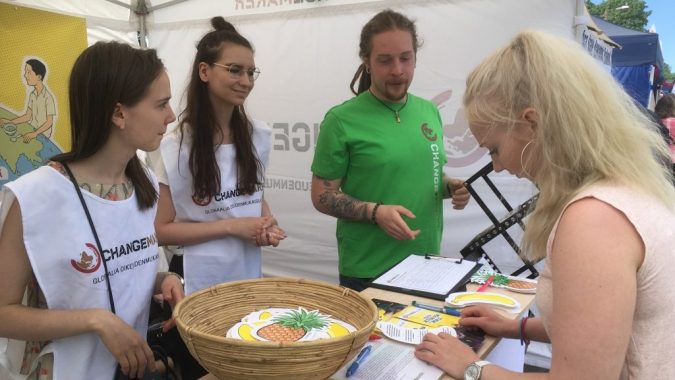
Campaigns on rights of asylum seekers 2017
In 2017 the main goal of Changemaker was to campaign for the rights and wellbeing of asylum seekers in Finland. Early in the year, as the start of the campaign coincided with the municipal elections, Changemaker campaigned to challenge Finnish municipalities to take in more asylum seekers. Municipal placement of asylum seekers includes, in addition to a place to stay, translation and other special services that asylum seekers may need.
From May onward, after the elections, the campaign theme shifted from promoting municipal placements to opposing forced repatriation of asylum seekers to Iraq and Afghanistan and demanding international protection for them. During May-September of 2017, Changemaker collected a total 1985 signatures to petition this. On October 4th, the petition was handed over to Minister of the Interior Paula Risikko.
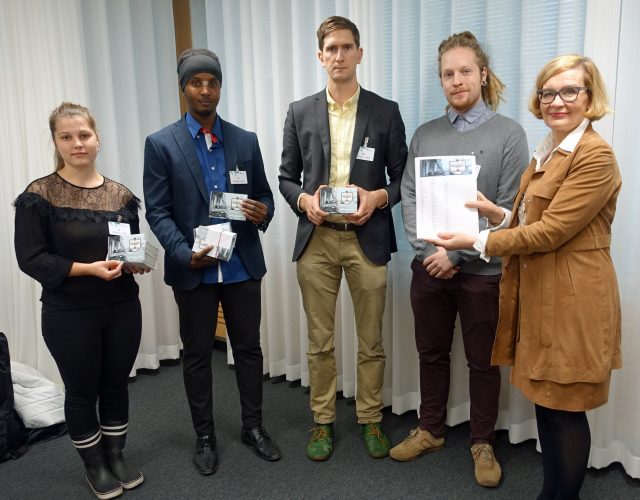
Kuva: Sisäministeriö
Campaign to end overfishing 2016
In 2016 Changemaker campaigned to end overfishing. Since the European Union is one of the largest players in the global fishing industry and yet a large part of the fish produce utilized within the Union is originally sourced outside its own regional waters, Changemaker sought to promote more responsible, sustainable fishing practices and legislation wherever European actors are involved. To that end Changemaker petitioned for all bilateral fisheries partnership agreements of the European Union to include set maximum fishing quotas for the European vessels engaged in activities beyond our borders. The petition collected 2586 signatures and was handed over to minister of Minister of Agriculture and the Environment Kimmo Tiilikainen in Decembr 2016. In addition Changemaker wrote a letter about the campaign to Karmenu Vella, member of the European Commission, in charge of Environment, Maritime Affairs and Fisheries.
Radicals of Peace 2015
The campaign’s goal was preventing violent radicalization among young people. Changemaker Finland wanted to change the way the concept of radicalization is usually discussed in the media and in our wider society. On practical level Changemaker collected loops with people’s thoughts on peace on them. Throughout the year over 2000 loops were collected in different kinds of events and in November they were put together to form a chain of peace, which was hung on a Christmas tree in Helsinki city center.
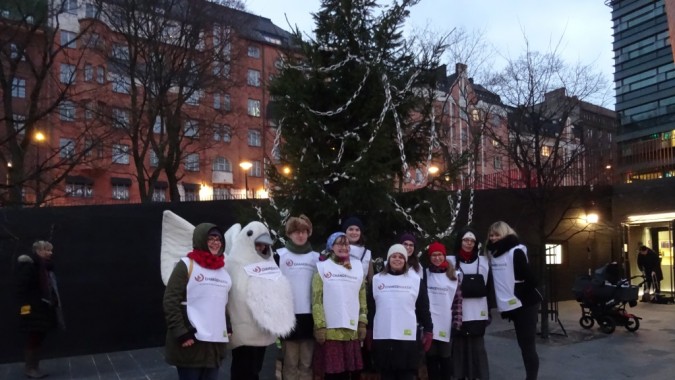
Tax Haven Tours 2014
In 2014 Changemaker participated in the Tax Haven Tours campaign with some other Finnish NGO’s. The goal of the campaign was to end the way international companies avoid taxes through tax havens and to stop the illegal capital outflows. Changemaker challenged three big Finnish companies KONE, Stora Enso and UPM-kymmene to publish their country specific tax reports by sending them post cards. People could participate in the campaign by signing a post card in an event and Changemaker sent the cards to the companies. Changemaker collected 3182 post cards.
Stop Land Grabbing 2013
Stop Land Grabbing campaign focused on land grabbing done by international companies. Many times these companies’ land grabbing endangers food security and farmers’ livelihoods in developing countries. In this campaign Changemaker insisted that companies owned by the Finnish government respect human rights and indigenous people’s land rights when purchasing land in developing countries. The petition was signed by over 3500 people during the year in events and online.
